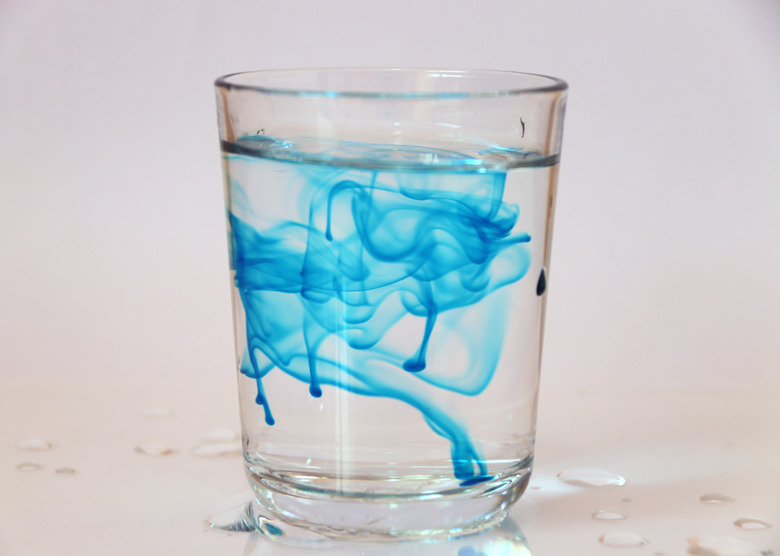Four Things That Affect Rate Of Diffusion
Diffusion occurs due to the random movement of particles. It usually happens due to a concentration gradient, meaning that molecules move from an area of high concentration to an area of lower concentration.
An example is shown in the image above. When dye is added to the solution it diffuses over time. At first you see streaks of blue moving through the solution until finally the entire solution becomes blue because the concentration of dye is the same everywhere. At this point, although the dye molecules are still moving around, you will not be able to perceive it since the blue dye has diffused and colored the entire volume of liquid.
Diffusion is thus a passive process (meaning that it does not require the input of energy). A substance moves from an area of high concentration to an area of lower concentration. This movement continues until the concentration of the substance evens out. Once the concentration has evened out, the substance still moves but will no longer have a concentration gradient. This state is called dynamic equilibrium.
What Factors Affect the Rate of Diffusion?
What Factors Affect the Rate of Diffusion?
Molecules are constantly moving around due to the amount of thermal energy they have. This movement is affected by the size of the particle and the environment the particle is in. Particles will always move around in a medium but the overall rate of diffusion can be affected by many factors.
Concentration: Diffusion of molecules is entirely dependent on moving from an area of higher concentration to an area of lower concentration. In other words, diffusion occurs down the concentration gradient of the molecule in question. If the difference in concentration is higher, then the molecules will go down the concentration gradient faster. If there is not as great of a difference in concentration, the molecules will not move as quickly and the rate of diffusion will decrease.
**Temperature:** Particles move due to the kinetic energy associated with them. As temperature increases, the kinetic energy associated with each particle also increases. As a result, particles will move faster. If they can move faster, then they can also diffuse faster. Conversely, when the kinetic energy associated with the molecules decreases so does their movement. As a result, the rate of diffusion will be slower.
**Mass of Particle:** Heavier particles will move more slowly and so will have a slower rate of diffusion. Smaller particles on the other hand will diffuse faster because they can move faster. As is key with all factors affecting diffusion, movement of the particle is paramount in determining if diffusion is slowed down or sped up.
**Solvent Properties:** Viscosity and density greatly affect diffusion. If the medium that a given particle has to diffuse through is very dense or viscous, then the particle will have a harder time diffusing through it. So the rate of diffusion will be lower. If the medium is less dense or less viscous, then the particles will be able to move more quickly and will diffuse faster.
All of the factors affecting diffusion can have a combined effect. For example, a small ion may diffuse more quickly through a viscous solution than a large sugar molecule. The ion has a smaller size and thus is able to move faster. The large sugar molecule moves slower because of its size. The viscosity of the solution affects both but will compound the slowed diffusion that the larger molecule undergoes.
TL;DR (Too Long; Didn't Read)
Any factor that speeds up movement of particles through a medium will result in a faster rate of diffusion.
Cite This Article
MLA
Gupta, Riti. "Four Things That Affect Rate Of Diffusion" sciencing.com, https://www.sciencing.com/four-things-affect-rate-diffusion-8348637/. 16 February 2020.
APA
Gupta, Riti. (2020, February 16). Four Things That Affect Rate Of Diffusion. sciencing.com. Retrieved from https://www.sciencing.com/four-things-affect-rate-diffusion-8348637/
Chicago
Gupta, Riti. Four Things That Affect Rate Of Diffusion last modified March 24, 2022. https://www.sciencing.com/four-things-affect-rate-diffusion-8348637/
